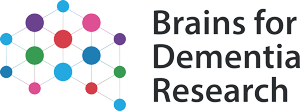Genomics data
What genetic data is available?
Brains for Dementia Research (BDR) have over 1300 cases of donated brain tissue from donors with a range of dementias as well as cognitively normal controls. All of the BDR cohort have genetic data from the Neurobooster array, which is a whole-genome screening array with specific content for neurodegenerative disease genetic mutations.
Where is the data stored?
The UK Brain Banks Network (UKBBN) stores genetic data for BDR and other collaborating studies in a variety of formats. Permissions are granted separately for each dataset and if you require access to any of these datasets, please contact the database manager: richard.cain@bristol.ac.uk
Do I need ethical approval?
No. The anonymised BDR data is covered by our own BDR approval, so individual research ethics review is not required. Requests from overseas require evidence of approval by your Institutional Review Board.
Are there charges involved?
No. Access to the UK Brain Bank Network (UKBBN) database and the data portal Dementias Platform UK (DPUK) are completely free of charge.
What genotypes are available?
Genotypes for around 800 of the BDR cohort have been completed. These cases have various phenotypes and genotypes are present for:
- almost 470,000 variants, including all GWAS SNPs identified in Lambert 2013
- APOE index
- SNPs for isoform determination (rs429358 and rs7412). The average genotyping rate is 0.985. The NeuroChip is a custom Illumina genotyping array with an extensive genome-wide backbone (n=306,670 variants) and custom content covering 179,467 variants specific to neurological diseases. There are 284 variants on the NeuroChip that are specific to AD, including 10 of the 19 initial GWAS index SNPs. For those GWAS index SNPs not included on the NeuroChip panel (n=9), individual SNP genotyping has been carried out ‘in-house’ using KASP assays following standard protocols (LGC, Middlesex). KASP assay genotypes called were confirmed using several samples with Sanger sequencing.
Do you assess ApoE status?
Samples are genotyped for APOE e2, e3 and e4 alleles using the TaqMan assay for SNPs rs7412 and rs429358 (Applied Biosystems) to determine APOE status.
Is researcher data uploaded?
Genetic data is held within the data portal Dementia’s Platform UK (DPUK). Access to this genetic data as well as associated assessment data is by application to DPUK https://www.dementiasplatform.uk/ All DPUK applications need to include a lay summary, hypothesis, (including scientific justification), and a section covering analysis. Applications received by DPUK are forwarded to BDR for review and subject to approval, access to the data is granted via the DPUK portal. Further information about the application process, can be found here


